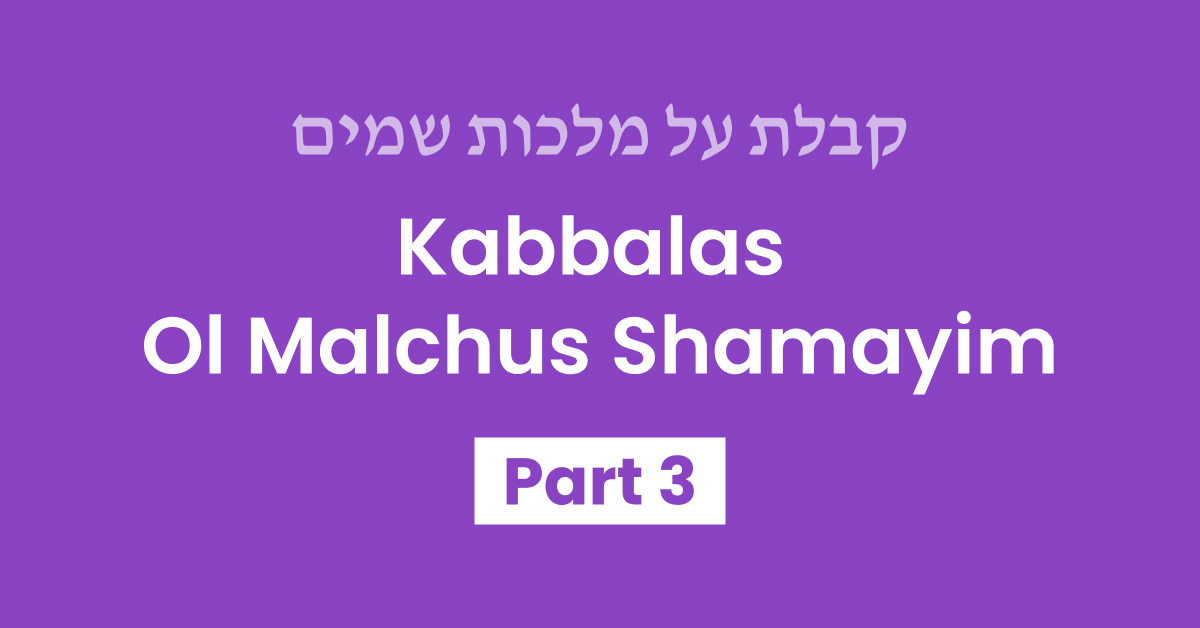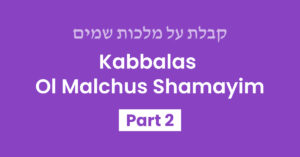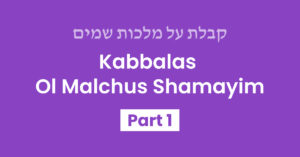We have spent the past month focusing on Kabbalas Ol Malchus Shamayim. We learned that our main obligation on Rosh Hashana is to crown Hashem as our King by accepting His will as our #1 priority. The more we demonstrate that fulfilling Hashem’s mitzvos is more important to us than anything else, the more we reveal His kingship in this world.
One way to strengthen our commitment to doing Hashem’s will is to contemplate the deeper meaning of Shema:“Hashem Echad” means that Hashem is the only One who truly exists in the entire universe, and everything else is totally dependent on Him. Even we – who feel so real and solid – are just like transient figments of Hashem’s imagination. Since Hashem is the only One whose existence is real and eternal, it behooves us to follow His wishes as the only important factor when making our day-to-day decisions.
As much as Hashem is King over the Jewish people as a whole, Hashem’s kingship must also be accepted by each of us individually. Every single person was created to fill a unique role in revealing Hashem’s kingship in this world. When we each do our part, we bring the world closer to reaching its ultimate purpose: Universal awareness of Hashem.
King or Dictator?
Are you happy that Hashem is your King, or do you accept His kingship begrudgingly?
Rav Dessler1 writes that on Rosh Hashana, it’s not enough to crown Hashem as king begrudgingly; we must strive to crown Hashem with joy.
We must strive to crown Hashem with joy.
Indeed, this is the fundamental difference between a king and a dictator. A dictator rules over his people by force, whereas a king is appointed willingly and with a sense of joy.2
Since Rosh Hashana is the time for crowning Hashem as our King, we must strive to do so with all the joy and festivities that a coronation ceremony normally entails. When a country appoints a new king, you can imagine they would probably blow royal trumpets, wear festive clothing, and serve lavish foods. We, too, celebrate Rosh Hashanah as a festive day to show that we are happy that Hashem is our King
This all sounds wonderful… But do we really feel happy that Hashem is our King? If not, what can we do to feel this joy?
But do we really feel happy that Hashem is our King?
Reasons for Joy
If you think about it, we are actually very fortunate that our King is Hashem, and not a regular human being. Here are just a few reasons:
(1) A human king treats his people like servants, but Hashem is also our Father3 – as we say: “Avinu Malkeinu – Our Father, Our King.” Hashem always loves us no matter what we do, just as a father always loves his children.
(2) A human king is sometimes motivated by evil or selfish intentions, but Hashem only wants to do kindness – as it says, “Ki Chofeitz Chessed Hu.”4 A human king might decree that everyone must pay exorbitant taxes or wear yellow on Tuesdays just because that’s his favorite color, but all of Hashem’s decrees are good, sensible, and fair.5
(3) A human king can be quick to anger – chopping off people’s heads if they dare disobey his will – but Hashem has endless patience and waits for us to do teshuva – as it says, “V’Ad Yom Moso Techakeh Lo, Im Yashuv Miyad Tekabilo… Until man dies, You (Hashem) wait for him; if he does teshuva, You accept him immediately.”6 Despite our frequent sins and mistakes, Hashem continues to shower us with amazing brachos of life, health, strength, and intelligence… even when we don’t deserve them!
(4) A human king might not always repay his servants for their work, but Hashem rewards us richly for fulfilling His mitzvos7. Not only that, but Hashem gives us the most awesome, eternal rewards, greater than we can ever imagine, as it says: “Yafeh Sha’ah Achas Shel Koras Ruach Ba’olam Haba Mikol Chayei Olam Hazeh – One moment of pleasure in the World to Come is greater than all [the pleasures] in this world.”8
(5) A human king is limited in that he can’t ever know the full story – so he might punish one of his servants for something the servant never did wrong. ButHashem knows everything that happened and even knows our innermost thoughts, feelings, and motivations.9 When Hashem administers justice, we can rest assured that it’s always fair and always based on what we actually deserve. Hashem’s judgments are based on the truth… He never assumes we had bad intentions unless we actually did.
Trembling With Joy
Chazal write10 that when we blow the shofar, Hashem gets up from His throne of Din (strict judgment) and moves to His throne of Rachamim (mercy). How does this happen? What awakens Hashem’s mercy?
Rav Dessler11 explains that when the Jewish people accept Hashem’s judgements with joy and love – and yearn to continue making a kiddush Hashem in this world – this awakens Hashem’s mercy. The more we demonstrate that we are happy with Hashem as our King, the more He will deal kindly with us in the judgement of Rosh Hashana!
The more we demonstrate that we are happy with Hashem as our King, the more He will deal kindly with us in the judgement of Rosh Hashana!
So as much as we go into Rosh Hashana trembling in fear of Hashem and His judgement, we must also remember to feel this sense of joy. We are so happy and fortunate that the One administering judgment on this day is Hashem. It would be much worse if we were judged by a human king of flesh and blood!
This is the meaning of the passuk in Tehillim, “Serve Hashem with fear, and feel joyous while trembling.”12 As much as we tremble on this Day of Judgment, we are happy, deep down, that Hashem is our King.
As much as we tremble on this Day of Judgment, we are happy, deep down, that Hashem is our King.
This Rosh Hashana, as we stand before Hashem pleading for a merciful judgement, let’s accept Him as our king with joy. Joy that our King is also our merciful Father – perfectly fair, all-knowing, infinitely wise, and full of love and patience for His children.
Sources: [1] Michtav Mei’Eliyahu Vol. II. pg. 71; [2] Malbim on Tehillim 22:29; Vilna Gaon on Mishlei 27:27; and Michtav MeiEliyahu Vol. III. pg. 22; [3] Devarim 14:1; [4] Micha 7:18; [5] Tehillim 19:9 and 119:137; [6] Mussaf of Rosh Hashana; [7] Rashi on Shemos 6:2; [8] Pirkei Avos 4:17; [9] Yirmiyahu 11:20; [10] Vayikra Rabba 29:3; [11] Michtav Mei’Eliyahu Vol. II. pg 71; [12] Tehillim 2:11
Your Challenge
Once a day, while (or before) doing a mitzvah, think:
“I am doing this mitzvah because Hashem is my King.”
For example:
- I am saying this bracha because Hashem is my King.
- I am going to hold back from saying these words of lashon hara because Hashem is my King, and He doesn’t want me to speak lashon hara.
- I am getting ready for Shabbos because Hashem is my King and He wants me to keep Shabbos.
- I’m going to get up early for davening because Hashem is my King and this is His Will.




